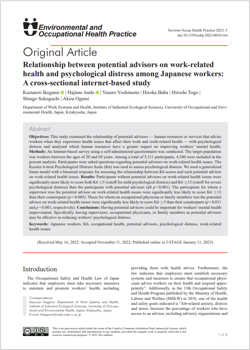#E0059 Potential advisors should help workers De-stress before they become Distressed

Potential advisors should help workers De-stress before they become Distressed
Workplace stress is now a global phenomenon and can adversely affect workers’ mental health. During the pandemic, workers were required to work remotely, which reduced contact with people and increased reliance on artificial intelligence. Some workers embraced this flexibility and freedom, but others experienced anxiety, depression, and isolation.
The crisis showed us that everyone handles stress differently. To alleviate stress in our personal life, we seek guidance from friends. Similarly, in our work life, we should seek advice from employers for work-related problems. In Japan, employers are being encouraged to provide health advice to assist workers who are stressed.
The Ministry of Health, Labour and Welfare suggests people from human resources who can act as potential advisors. Some roles, such as supervisory and managerial roles, entail creating a supportive environment. Other roles, such as those of health officers and occupational physicians, can provide more clinical-type functions. However, it was unclear which role workers might find most useful. Consequently, researchers conducted a two-year study to find out about this relationship. They used an internet company to survey 4,540 males and females between the ages of 20 and 69 years. Researchers asked respondents whether there were people on the job to whom they could talk to about work-related health concerns. Workers were also asked to identify a potential advisor, and finally, rate the extent to which they felt depressed or anxious.
The results showed a direct relationship between the absence and presence of a potential advisor. Similar to previous studies, the results showed that most workers were depressed or distressed when advisors were absent. Absence of advisors increased workers’ feelings of anxiety and isolation. Indeed, the researchers suggest that supervisors can detect and intervene at the first signs of workers’ distress. To this end, the degree of distress determined the type of desired advisor. For example, a supervisor advisor, as an organizational representative, suggested invaluable support and any stress was mild. Family and co-workers were also potential in reducing the psychological distress. Health service personnel were useful but their placement outside the immediate work circle suggested contact mostly for severe psychological issues rather than everyday concerns.
Overall the study suggests that the introduction of potential advisors into the workplace should improve workers' mental health and productivity. Further research on the relationship between potential advisors and the creation of stress in the workplace is now required.

Link to the original journal article:
https://www.jstage.jst.go.jp/article/eohp/5/1/5_2022-0010-OA/_article
Title of the paper:
Relationship between potential advisors on work-related health and psychological distress among Japanese workers: A cross-sectional internet-based study
Authors:
Kazunori Ikegami, Hajime Ando, Yasuro Yoshimoto, Hiroka Baba, Hiroshi Togo, Shingo Sekoguchi, Akira Ogami




